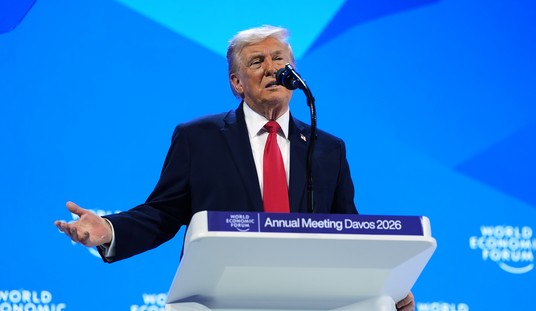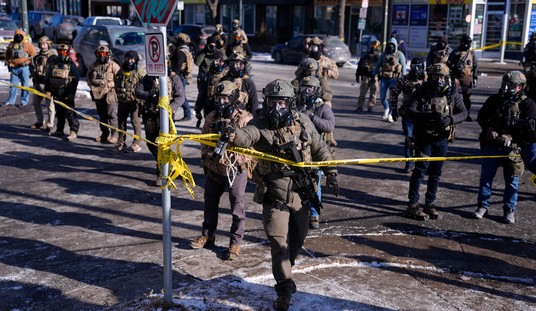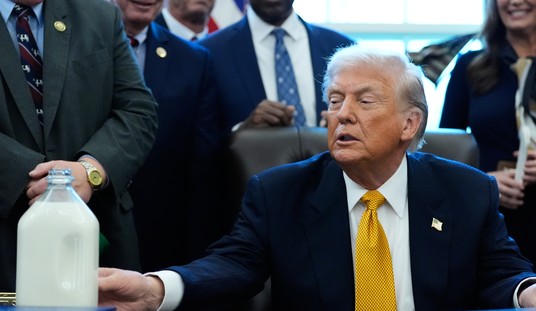CNN certainly seems to think so after talking with President Obama, who declined to shut the door on that contingency. CNN titled the video “Should coalition support Libyan rebels?”, a title which suggested a harder look at the side for which we are currently providing cover. Instead, CNN appears to have completely missed the question of who and what the rebels are and leaped all the way to whether we need to start providing them weapons and coordinate military action for their strategic and tactical needs. Indeed, according to this report, “the flexibility is already there” to do so:
After six days of war kinetic military operations, the coalition has disabled Gaddafi’s air power, but his ground forces are still effective and have the upper hand:
So far, the coalition has crippled the Libyan air force and established a no-fly zone along the nation’s coastline, U.S. Navy Rear Adm. Gerard Hueber said.
Allied forces gave no indication that ruler Moammar Gadhafi was complying with a United Nations mandate to stop attacks against civilians.
But a U.S. official said though the rebels are in a better position, the ruler’s forces still have the upper edge.
They remain capable of carrying out attacks on the opposition, are relatively well-organized and continue to fight effectively, the official said.
That means that the temptation to dig deeper in Libya will be powerful. Obama needs to show success in either knocking out Gaddafi or provoking a coup d’etat that removes him from power, and this operation came too late to reliably produce either. If the limited scope of this intervention fails to dislodge Gaddafi and his regime takes back Benghazi, Operation Odyssey Dawn will have become an expensive and embarrassing flop. Gaddafi will be left standing as a defiant military leader who faced down the West, and his status in that region will grow exponentially, making him and his sons more dangerous than ever.
Can Obama afford to walk away from Libya with that outcome? Can the US and the West?
Update: Elsewhere at CNN, Rand Corporation fellow Angel Rabasa says we should arm the rebels just as we did in Bosnia:
The U.N. Security Council resolution that authorized the no-fly zone and all necessary measures to protect civilians under attack in Libya did not call for Gadhafi’s ouster. There are reports that some Arab countries are considering deploying ground troops to Libya. But if they do, their role would likely be protection of the civilian population in areas outside Gadhafi’s control. That outcome would still leave Gadhafi in power in western Libya.
That leaves few effective options if the United States wants to prevent the crisis in Libya from leading to a prolonged armed conflict or de facto partition that leaves a ruthless, embittered dictator with a terrorist record in control of half the country. That situation could have long-term destabilizing consequences for Libya and the Middle East.
The way out of this conundrum would be for the United States to clarify its goals in Libya. Recognizing that lasting stability could only come about as the result of the removal of Gadhafi from power, the United States and like-minded countries could begin by recognizing the Benghazi government as the legitimate government of Libya. The Libyan National Council is, after all, a government set up by a popular uprising against tyranny and therefore inherently more legitimate than Gadhafi’s government in Tripoli.
The United States also might consider launching an effort to provide the Benghazi government with arms and equipment to defend itself against Gadhafi’s forces and to help it liberate western Libya. The U.S. need not become directly involved in the training and equipping of the Libyan opposition. As with the Bosnia train and equip program, a small U.S. team could help arrange for the purchase and delivery of arms, as well as supply training, possibly by third parties.
Would it be too much to ask to first determine who and what these rebels are? Are they forces of secular democratization and liberal human rights? Are they Islamists who want to establish a caliphate? Pan-Arabists who want to overthrow all of the established governments in the region? Ba’ath-style Stalinists? Before we start sending them weapons and deepening our involvement in this conflict, it might be nice to know these answers first.
By the way, aren’t we still in Bosnia?







Join the conversation as a VIP Member